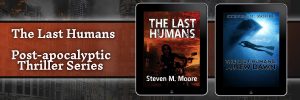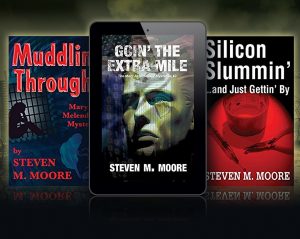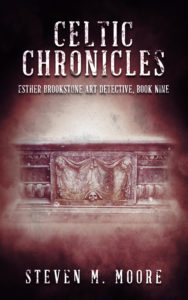Opening, back story, and flashback…
 Let’s consider The Last Humans: A New Dawn, #2 in “The Last Humans” series. Or #1 in that same series, or #3 in the “Mary Jo Melendez Mysteries” series. All the openings tell readers there are some thrills to be had. I then go on using back stories and flashbacks to continue the plots, often alternating between these story elements and dialogue and character development that normally will entertain at least a few readers.
Let’s consider The Last Humans: A New Dawn, #2 in “The Last Humans” series. Or #1 in that same series, or #3 in the “Mary Jo Melendez Mysteries” series. All the openings tell readers there are some thrills to be had. I then go on using back stories and flashbacks to continue the plots, often alternating between these story elements and dialogue and character development that normally will entertain at least a few readers.
 This isn’t “traditional storytelling,” by which I mean that ancient oral tradition associated with members of the tribe gathered around campfires in prehistoric times listening to a storyteller. As much as modern storytelling owes to this oral tradition, the written word, especially in more recent fiction after Gutenberg cast into print form, is much more complex. I’m amused when reviewers complain about my novels’ complexity and ask myself, “Are they stuck in medieval times?” Of course, they might think simplicity is what’s needed—many readers love cozy mysteries and bodice rippers, for example, that are just parodies of the human condition with cardboard cutouts for characters. I generally ignore reviews of my books, though, except for promo purposes (excerpts from them). Reviewers are entitled to their opinions, of course, but reading preferences are so subjective that I know I can’t please everyone.
This isn’t “traditional storytelling,” by which I mean that ancient oral tradition associated with members of the tribe gathered around campfires in prehistoric times listening to a storyteller. As much as modern storytelling owes to this oral tradition, the written word, especially in more recent fiction after Gutenberg cast into print form, is much more complex. I’m amused when reviewers complain about my novels’ complexity and ask myself, “Are they stuck in medieval times?” Of course, they might think simplicity is what’s needed—many readers love cozy mysteries and bodice rippers, for example, that are just parodies of the human condition with cardboard cutouts for characters. I generally ignore reviews of my books, though, except for promo purposes (excerpts from them). Reviewers are entitled to their opinions, of course, but reading preferences are so subjective that I know I can’t please everyone.
The opening is sometimes called “the hook,” a bit insulting to readers because they’re being compared to fish. Hmm, are books just bait then? All three novels I mentioned above open with action. Other novels might open with psychological stress, using the internal dialogue of a main character. The purpose is the same: Get the reader interested. That’s necessary at the beginning of the novel-writing marathon.
Even with psychological stress, back story (e.g. why the character is stressed) or flashbacks (a quick remembering of the stressful situation) can be used with character description to construct a solid opening. Authors must grab the readers’ attentions, but they also must also explain why it’s important to do so.
I probably do better when opening with action than I do describing a person’s stress. That might seem to be a contradiction to the complexity I desire, but personal thoughts might lead to meandering, which is deadly at the start of the literary marathon. In Celtic Chronicles, I start with Bastiann’s thoughts about Esther’s plans for them to volunteer to help at an archaeological dig. Banter accompanied those thoughts, though, something akin to action, and I kept things simple.
In other words, an author can combine the two, mixing thoughts with action. The fundamental goal is to begin with something that’s happening. The why can come later when the reader needs a breather, unless it’s not that complicated. Critics often say a story is like a rollercoaster ride (an overused description to the extent that it has become a cliché), but that’s what an author wants to achieve—the ups and downs of his marathon race (more like the Boston course than the NYC one) that the readers can run with him. At the beginning of the race, though, the author might want to put the reader at the top of the rollercoaster so the downhill thrill comes right away. Future uphill climbs are then akin to back story and flashbacks.
***
 Comments are always welcome. (Please follow the rules found on my “Join the Conversation” web page. If you don’t, your comments will go to the spam folder.)
Comments are always welcome. (Please follow the rules found on my “Join the Conversation” web page. If you don’t, your comments will go to the spam folder.)
Celtic Chronicles. This ninth novel in the “Esther Brookstone Art Detective” series. Esther and Bastiann volunteer to work at an archaeological dig near their modest castle outside Edinburgh. A student also working there is murdered. Police Scotland finds a Russian oligarch’s number on the lad’s call-list. That Russian is on his yacht anchored off the Scottish coast. As the investigation continues, everything becomes more complex, other characters come into play, and the intrigue and suspense increase. Published 5/23 by Draft2Digital, this ebook will soon be available wherever quality ebooks are sold (just not on Amazon). Note that #6 and #7 are free PDF downloads (see my “Free Stuff & Contests” web page for those novels and other free fiction).
On pubprogressive.com tomorrow: “Why we might need a civil war…”.
Around the world and to the stars! In libris libertas!
